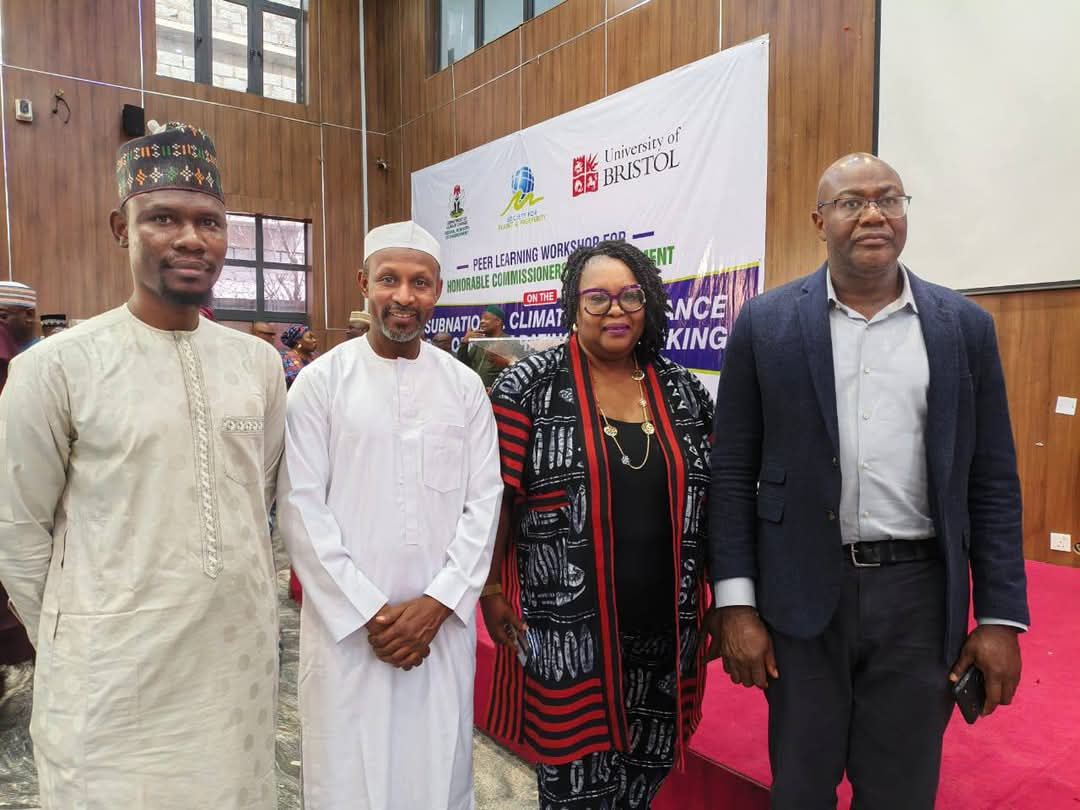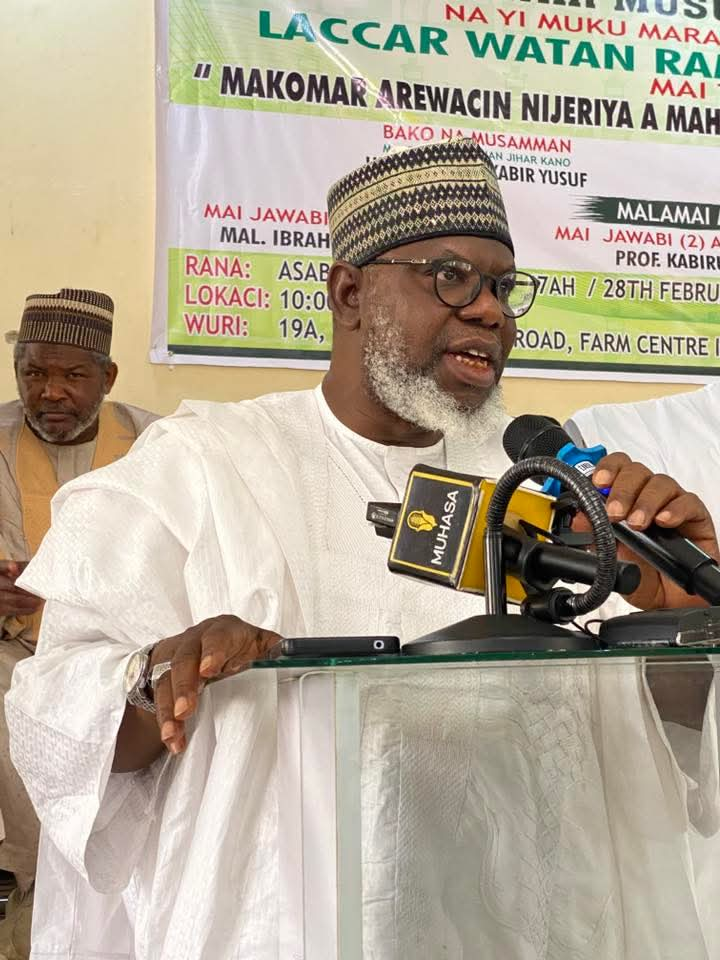Headlines
ASUU strike: How companies can fund universities with taxable profit – FRIS

Nasiru Yusuf
The Federal Inland Revenue Service (FIRS) said Nigeria’s company income tax law has allowed corporate organisations to donate up to 20% of their taxable income to universities.
KANO FOCUS reports that the legal officer in the legal department of FIRS, Barr. Thihwi Dauda revealed this while making a presentation titled, ” CSOs and Profit-making; legal perspective”, at the three-day National Conference on Civil Society Regulatory Environment in Nigeria organised by the EU-ACT project in Nigeria.

Dauda pointed out that if these provisions of the tax laws were exploited by our universities, the incessant strike by the Academic Staff Union of Universities, ASUU would have been addressed.

Cross section of participants
“There is provision for donations to the Universities; Section 25a and 26 of the Company Income Tax makes a provision that a company can make a donation to the University up to 20% of its total cost and that donation will be removed as an allowable expenses in the company book.
“If all these blue chip companies are making donations to the Universities under that section, I think most of the infrastructure the Universities need today will be there and it will reduce the incessant strike by ASUU,” Mr Dauda said.
The tax official urged Civil Society Organisations to exploit the provisions of the nation’s company income tax laws to solicit funds from companies to finance their not for profit operations.
According to him “Donations made to CSOs by companies are allowable expenses under the companies income tax.

Cross section of diginatries
“Section 23, sub-section 1c made a provision that when a company make donation to CSOs which is not more than 10% of its profit, such donation is an allowable deduction in the financial book of that company. So the company will not suffer for making such donation.”
He noted that although operations of CSOs are exempted from tax, profit made from businesses undertaken by subsidiaries of CSOs such as schools, hospitals and other social enterprises are taxable by law.
“Under the provisions of the law profits generated by CSOs through legitimate business cannot be shared by the promoters of the organisation, but spend in the realisation of its objectives,” Mr Dauda said.

Cross section of participants
The three-day conference began Tuesday in Abuja with the support of the European delegation to Nigeria, ECOWAS and the Agents for Citizen-Driven Transformation (ACT) programme.
Attendees included representatives of civil society groups, government (regulatory agencies, legislators, etc), development partners, donor community, private sector, opinion leaders and other interest groups.
The participants at the conference recommended that the government should provide incentives for companies operating in Nigeria to make donations to the nonprofit sector and such donations can be deducted from the company’s tax liability as stipulated by the Company Income Tax Regulation.
They also urged regulators to ensure CSOs have access to needed information on existing guidelines and obligations of the non-profit sector to ensure total compliance with such regulations.

Cross section of participants
“It is imperative for the regulators to constantly engage the CSOs to provide updates and provide needed assistance in compliance with the regulations including complying with the rules of the Financial Reporting Council,” participants said.
They said CSOs in Nigeria are currently burdened with multiple regulatory laws and some of such laws have very insidious provisions that tend to stifle the CSOs’ operational environment.
A cross-section of panellists conceded that “CSOs in Nigeria have always been regulated, but recently introduced regulations such as CAMA and the proposed NGO regulation bill have provisions that cast doubt on the intentions of the government.
“These kinds of regulations are what continue to put both regulatory agencies and civil society actors at loggerheads,” they said.
The 3-day National Conference on Civil Society Regulatory Environment in Nigeria brings together various actors from the civil society sector, and government including regulatory agencies and legislators, as well as donors and other stakeholders, to discuss pertinent issues that affect the effectiveness and impact of the civil society sector from the point of view of enabling a conducive regulatory environment for CSO operations in the country.
The broad objective of the conference is to create an opportunity for stakeholders to synergize efforts at improving the CSO regulatory environment.
The Conference is aimed at generating shared understanding and collective perspectives by stakeholders on appropriate instruments of regulation and effective processes to regulate CSOs operation in Nigeria as well as increasing broad public awareness about the roles of CSOs and the need for an enabling regulatory environment to protect the sector from repressive legislation.
This convergence is the first of its kind to provide a neutral platform for multi-stakeholder dialogue and ensure that all relevant opinions from all concerned groups are holistically collected.
It is therefore hoped that the conference will result in the development of comprehensive recommendations arising from the resolutions reached and agree on modalities for implementing the recommendations.
The Conference was supported with funding from the European Union delegation to Nigeria and ECOWAS and the Agents for Citizen-Driven Transformation (ACT) Programme which is implemented by the British Council.

Headlines
Kano emerges as MRV pilot state, advances climate governance

Nasiru Yusuf Ibrahim
Kano State has strengthened its position as a leading subnational actor in climate governance following a strategic departmental meeting of the Kano State Ministry of Environment and Climate Change.

KANO FOCUS reports that a major highlight of the meeting was the state’s intensified support for Nigeria’s Second Biennial Transparency Report (BTR2) under the United Nations Framework Convention on Climate Change (UNFCCC). The ministry disclosed that ongoing collaboration with sectoral ministries, departments and agencies (MDAs) across Energy, Agriculture, Forestry and Other Land Use (AFOLU), Waste and Industrial Processes is ensuring credible and harmonised greenhouse gas emissions data in line with the transparency requirements of the Paris Agreement.
In what officials described as a significant milestone, Kano has been selected as one of three pilot states under the UK PACT programme to develop a Measurement, Reporting and Verification (MRV) system. The initiative is expected to institutionalise structured emissions reporting, strengthen accountability mechanisms and support tracking of Nigeria’s Nationally Determined Contributions (NDCs).
In a statement signed by Dr. Umar Saleh Anka, Director of Climate Change, the ministry also announced the commencement of preparations for the third edition of the Climate Governance Performance Ranking. The exercise aims to enhance methodological rigour, promote peer learning, improve transparency and deepen stakeholder engagement in climate action.
Further consolidating the state’s leadership role, the Commissioner for Environment was recently appointed Regional Lead (North West) of the Community of Practice for Environment and Climate Change, a move expected to strengthen regional collaboration and policy coordination.
The statement added that, the state government reaffirmed its commitment to strengthening institutional systems, improving emissions transparency and advancing coordinated climate action across Nigeria.

Headlines
Only 30% of school-age children attend school in Northern Nigeria – Prof. Shehu

Nasiru Yusuf Ibrahim
The Executive Secretary of the National Educational Research and Development Council, Prof. Salisu Shehu, has disclosed that only 30 per cent of school-age children in Northern Nigeria are currently attending school.

KANO FOCUS reports that Prof. Shehu made the revelation on Saturday while delivering a lecture at the 10th Ramadan Lecture organised by the Islamic Forum of Nigeria in Kano.
He said Nigeria presently has over 20 million out-of-school children, a figure he noted is rising due to armed banditry in the North-West and insurgency in the North-East. According to him, the closure of many schools in some states as a result of insecurity has further worsened the situation.
The educationist also expressed concern over the shortage of teachers in schools, despite increasing retirements, deaths, transfers and career changes among teaching staff. He lamented that examination malpractice, combined with weak oversight, has led to what he described as a collapse of the education system in Northern Nigeria.
“Products of examination malpractice are now becoming teachers and lecturers, thereby perpetuating the cycle,” he said.
Prof. Shehu warned that lack of access to education is contributing to thuggery and banditry in the region, stressing that education produces responsible citizens, while ignorance breeds irresponsibility.
He urged Northern governors to declare a state of emergency in the education sector and prioritise funding and reforms. He also advised citizens to establish education endowment funds, citing examples from Bangladesh and Malaysia where Muslim communities have addressed similar challenges through charitable initiatives.
The professor criticised what he described as misplaced priorities, questioning why some governors sponsor pilgrimages while many citizens lack access to basic education and quality healthcare.
Presenting a paper on the fate of Northern Nigeria in terms of security, Alhaji Ibrahim Ado Kurawa linked climate change and global warming to the worsening security challenges in the North-East. He identified the longstanding farmer-herder conflict as a root cause of banditry in the North-West.
Kurawa noted that insecurity has contributed to making the North-East and North-West the poorest regions in the country. He expressed dismay that Northern Nigeria has failed to effectively address the issues of almajiranci and out-of-school children since the First Republic.
He called for sincerity in governance, political reforms and greater collaboration among Northern groups such as the Arewa Consultative Forum (ACF) and the Northern Elders Forum (NEF), alongside the Islamic Forum of Nigeria.
On the economic outlook of the region, Prof. Kabiru Isa Dandago decried rising poverty, unemployment, overdependence and the high cost of living as major challenges confronting Northern Nigeria. He advocated for a strategic development plan and urged voters to elect credible leaders as a pathway to change.
In his address, the Chairman of the Islamic Forum of Nigeria, Gen. Ahmad Muhammad Daku, said the 2026 edition marked the 10th anniversary of the annual Ramadan lecture series. Represented by Alhaji M.T. Bello, he noted that the topics were carefully selected to address contemporary issues affecting Northern Nigeria.
The Acting Executive Secretary of the Forum, Alhaji Dalhatu Gwarzo, appreciated the lead presenters, particularly Prof. Shehu, for their contributions. He announced that a team of rapporteurs had been constituted to compile the papers and comments for a post-Ramadan roundtable discussion with stakeholders.
Gwarzo also revealed plans to publish a compendium of the ten Ramadan lectures delivered over the past decade for the benefit of the Muslim community. He urged Muslims to pray for Northern Nigeria, the country and the world amid prevailing challenges.
He further appealed to political leaders to ensure proper implementation of the new Computer-Based Test (CBT) policy for candidates sitting for the West African Examinations Council (WAEC) senior secondary school examinations.
Former Secretary to the Kano State Government, Alhaji Sule Yahaya Hamma, said 80 per cent of Northern Nigeria’s problems could be addressed by governors, urging them to take decisive action in their respective states.
Chairman of the Council of Ulama, Malam Ibrahim Khalil, emphasised patriotic leadership as a solution to current challenges, citing the example of Khalifa Umar bin Abdulaziz as a model of responsible governance.
Other dignitaries at the event included the Emir of Rano, Amb. Muhammad Isa Umaru, and the Madakin Zazzau, Alhaji Munir Jafaru.

Headlines
Kano state Police command suspends Tashe cultural performance

Nasiru Yusuf Ibrahim
The Kano State Police Command has announced the suspension of the traditional Tashe performance usually held during the month of Ramadan, citing security concerns.
KANO FOCUS reports that in a public announcement issued on Saturday, the Command said the decision was taken in liaison with the Kano State Government to safeguard public safety and prevent criminal elements from exploiting the festivities.

The statement noted that the annual Tashe event has, in recent times, been used by some individuals to perpetrate crimes such as thuggery, handset snatching and drug abuse. According to the police, adequate security measures have been put in place to curb such activities and ensure a peaceful Ramadan period across the state.
The Commissioner of Police, Ibrahim Adamu Bakori, urged parents, guardians and members of the public to cooperate with security agencies by cautioning their children and wards against engaging in activities that could disrupt law and order. He warned that anyone found violating the law would face the full consequences.
The Command, however, extended its best wishes to residents of Kano State for a successful and peaceful Ramadan fast.
For emergencies, the police advised residents to contact the Command through its designated helplines or use the “NPF Rescue Me” application available on the Google Play Store.












